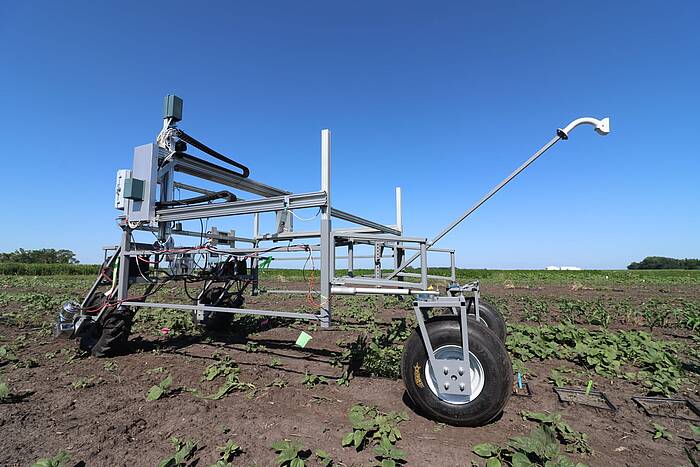
The NDSU Precision Agriculture Program’s new robotic platform may soon be used to teach tomorrow’s producers. The high-tech “Weedbot system” had its first field test on July 2.
The device is 6 feet wide, 12 feet long and stands 7 feet tall. It is intended to be a high-throughput, multi-functional crop data collection system. The platform is designed to work on soybean, corn, flax, lentil, field pea, dry bean, canola or sugar beet fields.
It carries RGB (red, green, blue) and hyperspectral cameras, an automatic scanning system and a remote-control robotic walking system.
“The robotic platform’s first stage of use is to collect weed imagery sensor data, and then use Artificial Intelligence to identify weeds in the field to reduce the use of herbicides. That lowers farming input costs and gives consumers healthier food products,” said Xin “Rex” Sun, assistant professor of agricultural and biosystems engineering.
“In the future, I plan to make this platform our ‘all-in-one’ vehicle for the NDSU Precision Agriculture Program,” Sun said, noting graduate students could work on autonomous navigation projects, undergraduate students could develop Global Positioning System projects or it could provide hands-on instruction for students in his Introduction to Precision Agriculture class. “We hope that producers can have similar robotic systems to help them scout crops, detect disease, spray weeds and reduce labor-intense work.”
NDSU graduate student Cristiano Costa is a member of the Precision Agriculture research team that developed the platform.
“It has been exciting to be part of this project,” said Costa, who is from Porto, Portugal. “Every team member has a particular set of skills and strengths, which allows me to learn something new every day. Furthermore, the results of this project will contribute to increased farming efficiency, which has always been a goal of mine.”
The robotic platform research is funded through a USDA-ARS project. The principal investigator is Greg Lardy, vice president for agricultural affairs, and the total grant is about $4.3 million for a five-year period.
NDSU’s Precision Agriculture Program was launched in January 2019, and has seen rapid growth. “The number of students enrolled in my Introduction to Precision Agriculture course has already doubled, compared to the last semester,” Sun said. “Precision Agriculture, smart farming and technology are definitely the future of the agriculture business.”
As a student-focused, land grant, research university, we serve our citizens.





